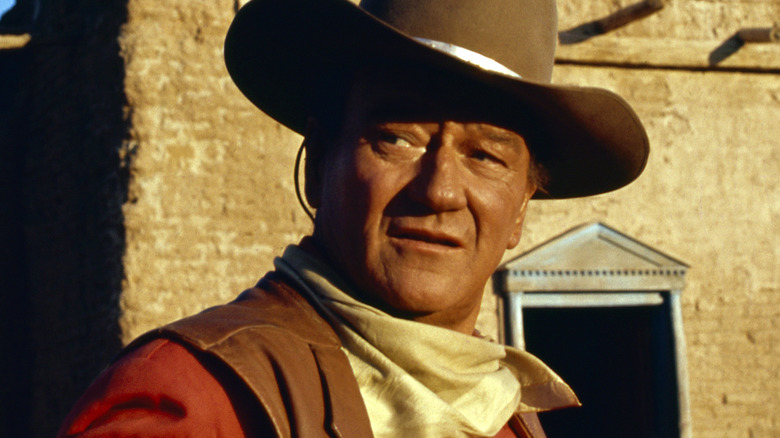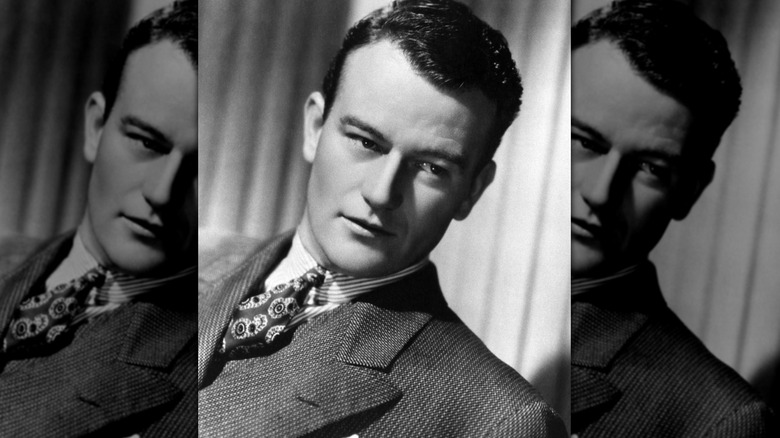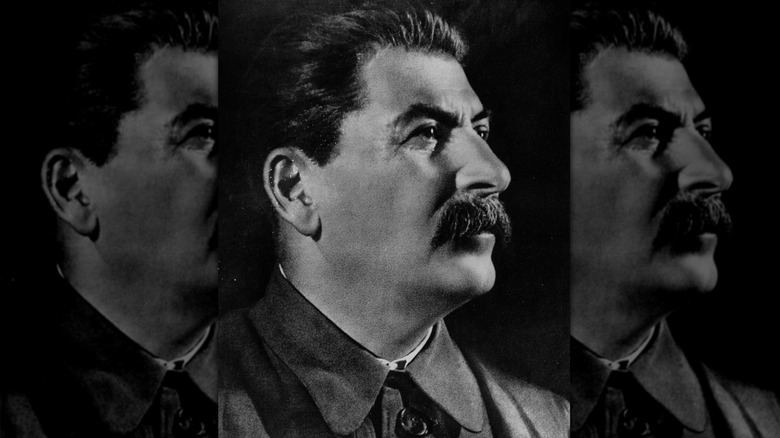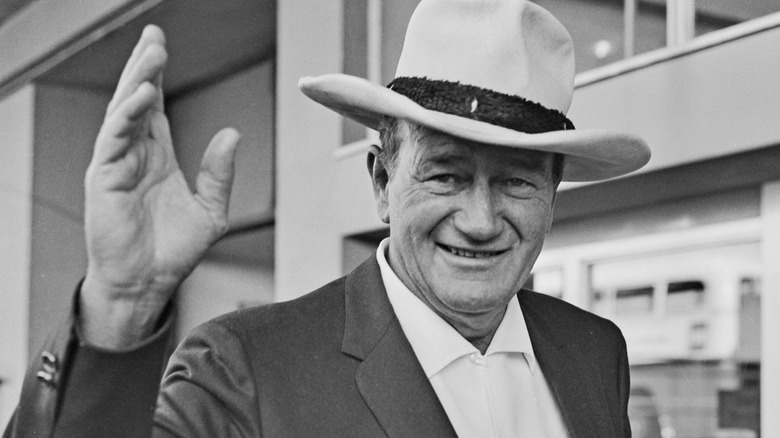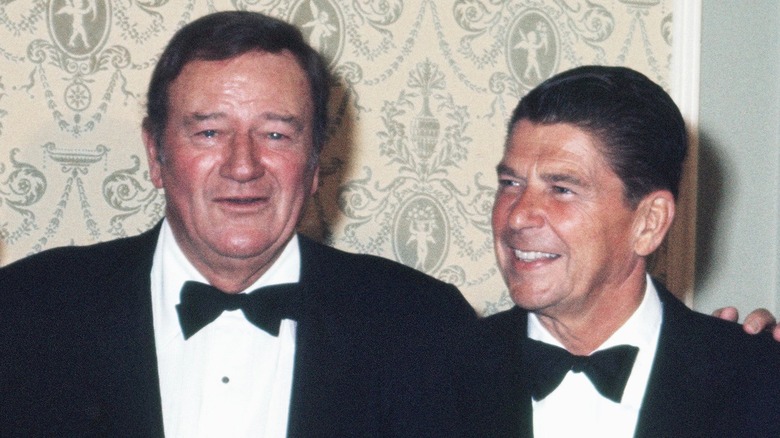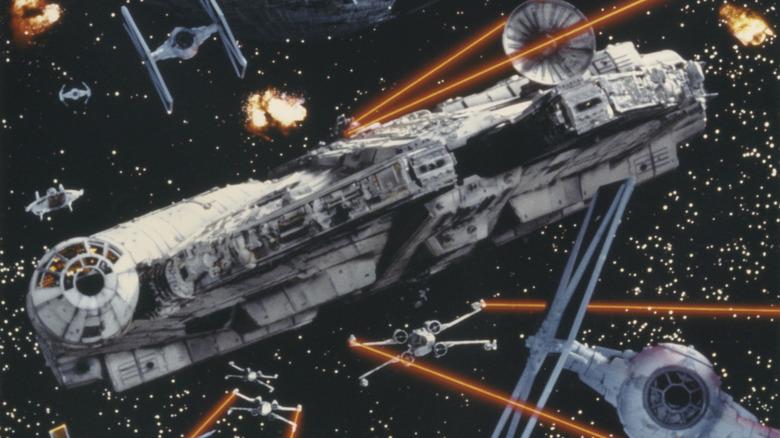Strange Details About John Wayne Everyone Ignores
Though impressionists and satirists have made it possibly the one word most associated with him, John Wayne's roles in "The Man Who Shot Liberty Valance" and "McLintock" were the only films where he called anyone "pilgrim," most prominently in the former. It's a quirk of one of his more famous characters that got conflated with the man himself over time. And the story about Wayne and other artists who worked on "The Conqueror" developing cancer due to being downwind of nuclear testing? Possible, but unsubstantiated. The percentage of the film's crew who developed cancer roughly matched the national average.
But that's how mythmaking can go: A small detail or tantalizing claim catches on in the collective memory and grows with each repetition. It happens to all sorts of famous folk, be they statesmen, scientists, or celebrities. And few celebrities achieved the level of fame and instant recognition that John Wayne did. Decades after his tragic death, he's still an icon of American culture, though his legacy has been colored by closer examination of his less-than-noble attitudes and qualities (and an interview that still outrages people today).
Even the most famous of men, however, can't have every detail of their lives be public knowledge. Wayne had his own quirks, adventures, and episodes that tend to be overlooked. Here are a few odd facts from the life and times of John Wayne.
He was Duke before he was John Wayne
"John Wayne" is a stage name. He was born Marion Robert Morrison (his last name often misreported as Michael) on May 26, 1907, in Winterset, Iowa. He wouldn't adopt the name John Wayne until 1930, several years into his acting career. Studio executives cooked it up ahead of his first starring vehicle, "The Big Trail," without even involving him. But before he became John Wayne, Marion Morrison already had another moniker.
Film buffs and even some casual fans have likely heard Wayne referred to as "Duke" by friends and colleagues. It was a nickname he had from childhood. After his family moved to California, they got young Wayne a dog named Duke. The pair were inseparable, so much so that the family started to refer to them as Big Duke and Little Duke (Marion was Big Duke, as the dog was an Airedale terrier). The family didn't come up with the nickname, though. Wayne liked to visit the local firehouse with his pet, and it was the firefighters there that first named him for his dog.
When he first became an actor, Wayne took his faithful dog's name as his own. His initial nom de plume for film work was Duke Morrison. It was a name that would only get one on-screen credit, for 1929's "Words and Music."
Stalin tried to have the actor killed
That John Wayne was an outspoken conservative is no secret — not that he tried to make it one. He publicly supported Republican presidential candidates, starred in a film that cast the House Un-American Activities Committee in a favorable light, and was once a member of the far-right John Birch Society (though he later withdrew after it promoted conspiracy theories about fluoridation of water). It almost goes without saying that a man of such politics was an outspoken anti-communist.
Wayne's stalwart anti-communism and pro-America rhetoric was so prolific and prominent that it caught the notice of the leader of the Soviet Union. Joseph Stalin was a big film fan, both for the art and for the potential of cinema to promulgate Soviet ideology. He liked to play the parts of studio mogul and backseat editor with Russian filmmakers, "correcting" their work on aesthetic and political grounds. He also enjoyed imports from the West, including the work of Charlie Chaplin. But Stalin did not like John Wayne at all.
It wasn't the parts that Wayne played that got under Stalin's skin — he liked Westerns. But he allegedly considered the actor's statements a danger to the communist cause. Possibly while drunk, he is said to have ordered Wayne's assassination, and killers were sent to Los Angeles to take the star out before being intercepted by the FBI. As reported by The Telegraph, Nikita Khrushchev later told this story to Wayne himself, taking the credit for calling off his "mad" predecessor's ill-conceived hit.
Wayne once leaned left in his politics
You might think that a man so outspoken and committed to Republican politics that Joseph Stalin wanted him dead would never have strayed from the political right. And John Wayne was certainly a political conservative for much of his adult life. But in the same 1971 Playboy interview where he infamously dismissed social programs, Native American genocide, and civil rights, he also admitted: "In the late 20, when I was a sophomore at USC, I was a socialist myself."
Wayne claimed that he abandoned his early leftwing beliefs by the time he left college. "The average college kid idealistically wishes everybody could have ice cream and cake for every meal," he told Playboy. "But as he gets older and gives more thought to his and his fellow man's responsibilities, he finds that it can't work out that way — that some people just won't carry their load." But he may not have gone over to the right as early as he claimed or remembered. He supported Franklin Delano Roosevelt for president in the 1930s, described himself as a Democrat, and starred in a movie — "Stagecoach" — that has been taken as a pro-New Deal parable.
He sided with Jimmy Carter on the Panama Canal
John Wayne passed away in 1979, never living to see Ronald Reagan take the White House and spearhead a conservative revolution that swept Washington, D.C. He almost certainly would have approved of Reagan's election. The two had been friends ever since Wayne sent Reagan encouraging messages when the future politician, as president of the Screen Actors Guild, led a strike in the 1960s. He later helped Reagan's 1966 campaign for California governor and supported Reagan's first bid for the Republican presidential nomination.
Yet despite their friendship, Wayne felt compelled to write Reagan a furious letter in 1977, accusing him of spreading falsehoods about the Panama Canal Treaty. Wayne broke with many conservatives in approving of the treaty's granting Panamanians full control over the canal. His first wife was from Panama, and he had been friendly with its dictator, Omar Torrijos. Reagan was part of the conservative opposition, and Wayne considered his friend's attacks on the treaty to be opportunistic and misleading. He made a point by point rebuttal to Reagan's comments in his letter, written on Republican National Committee (RNC) stationery. He also accused Reagan of being either careless in reading the treaty or obtuse in comprehending it.
Wayne sent a copy of his letter to President Jimmy Carter, who heartily approved of it. It wasn't the only positive gesture the actor made to the Democratic incumbent — he accepted an invitation to Carter's 1977 inauguration and gave a warm and encouraging speech the night before the big day.
Wayne (sort of) had a cameo in Star Wars
John Wayne's last credited film work was as J.B. Brooks in 1976's "The Shootist." Even though he would live another three years, his health was already in decline during filming of the movie, and the story reflects the actor's life at the time in being about an aging man dying of cancer. But while Wayne never worked in film again after 1976, his voice was repurposed for another part before he died.
During post-production on "Star Wars," sound designer Ben Burtt was trying to come up with a sound for the Garindan, the long-nosed, vaguely mosquito-like alien who tracks down the heroes in Mos Eisley. "Most of the good sounds have been accidents," Burtt told the Star Wars Celebration convention years later (via the official Star Wars blog). In this case, the accident was a buzzing noise coming from a synthesizer that was triggered by John Wayne's voice. Using discarded loop lines of Wayne's from the studio archives, Burtt was able to come up with a distinctive voice for the Garindan and create a memorable, if indirect, cameo.
